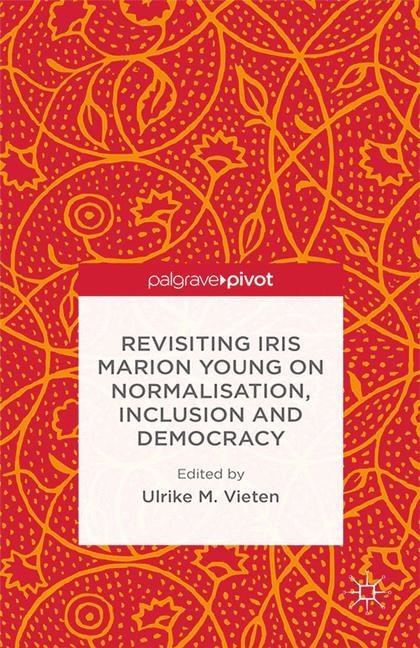Read more
Informationen zum Autor Máriam Martínez-Bascuñán, Universidad Autónoma de Madrid, SpainJosé Medina , Vanderbilt University, USAHalleh Ghorashi, VU University Amsterdam, NetherlandsGuno Jones, VU University Amsterdam, NetherlandsSara de Jong, University of Vienna, Austria Klappentext Revisiting Iris Marion Young on Normalisation, Inclusion and Democracy presents an innovative collection of politically and theoretically inspiring papers by feminist, queer and postcolonial writers. All authors engage with Young's politics of cultural difference and a 'politics of positional difference' read against her critique of normalisation. Zusammenfassung Revisiting Iris Marion Young on Normalisation! Inclusion and Democracy presents an innovative collection of politically and theoretically inspiring papers by feminist! queer and postcolonial writers. All authors engage with Young's politics of cultural difference and a 'politics of positional difference' read against her critique of normalisation. Inhaltsverzeichnis Notes On Contributors Preface Introduction Keeping Young's Legacy Alive: Why Do Normalisation And Difference Matter To Our Understanding Of 21st Century Notions Of Democracy And Inclusion?; Ulrike M. Vieten Contextualizing I. M. Young's Legacy Theorizing The Matter Of Societal Crisis: The De-Normalisation Of The Normative Sketch Of The Following Five Chapters 1. Why Should We Think Of Structural Injustice, When Speaking About Culture?; Máriam Martínez Bascuñán Revisiting Iris Marion Young's Political Theory Of Difference Imagination As Emancipation Puzzling Liberal Assumptions: Is The Common Good 'The Good' Or Perhaps, The 'Go(o)d' Of A Few? Why Social Groups Instead Of Ethnic Minorities? Culture Or Structure? Thinking Difference Differently: Naming Structural Differentiations First Why Inclusion Rather Than Integration: The Struggle For Structural Transformation And Self Development Why Normalisation Rather Than Toleration: Deconstructing The Logic Of Tolerance, And Its Limits Toward A Heterogeneous Model Of Democracy Outlook 2. Communicative Democracy And Solidarity Across Racial And Sexual Differences; José Medina Introduction Communicative Democracy And Pluralistic Sensibilities Shared Responsibility And The Social Connection Model Solidarity, Disidentification, And Queer Activism Conclusion 3. Routed Connections In Late Modern Times; Halleh Ghorashi Introduction Late Modernity And Super Diversity Longing For The Roots Of The Past Deep Democracy Reviving The Connection To The City From Comfort Zones To Safe Spaces Delayed Interspaces For Connection Connectedness Without Nationalism Concluding Remarks 4. Just Causes, Unruly Social Relations. Some Tensions Between Universalist Inclusive Ideals And Dutch Political Realities; Guno Jones Introduction Repressed Hierarchies: Colonial Analogies Present Day Symbolic Hierarchies Between Citizens Obscuring Structural Injustices Symbolic Hierarchies And Formal In-Equalities Concluding Remarks 5. Diversity Politics AndThe Politics Of Difference; Sara De Jong The Politics Of Difference Diversity Politics Diversity Politics And 'Difference' Diversity Politics And Intersectional 'Difference' Justice Vs. Utility The 'Value Of Difference' And Normalisation Conclusion...

